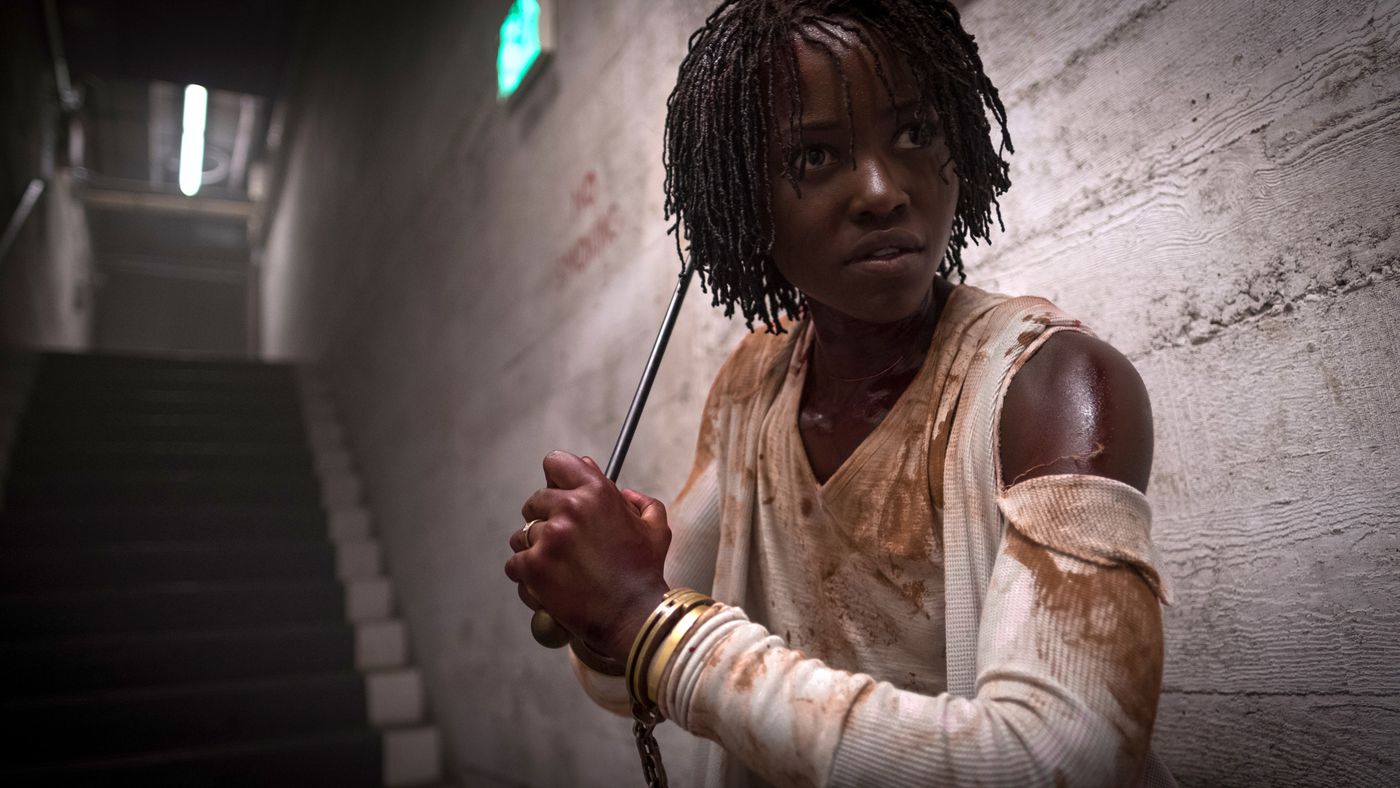A vacationing family is terrorized by doppelgangers in Jordan Peele’s sophomore outing Us, a tense thriller featuring a high-bar performance from star Lupita Nyong’o and Peele’s signature blend of comedy, terror and social allegory that, for a while at least, proves an enjoyable ride.
Peele, riding on the massive cultural success of his Oscar winning 2017 thriller Get Out, about Obama-supporting liberals appropriating and enslaving Black bodies to ensure their own longevity, sets his sights here on another crafty metaphor ripe for interpretation, but we’ll get to that in a moment.
The slow-burn set up gives us forty minutes of family bonding and rising dread. In the picture’s 1986 opening scene, Peele reminds us of the near forgotten Hands Across America initiative in which Americans fighting homelessness and hunger formed a coast-to-coast human chain, a motif resurrected and recast to delicious result throughout this new picture.
Watching this television news footage is adolescent Adelaide (Madeleine Curry), who on a family outing to the San Cruz Beach boardwalk wanders directly into a house of mirrors and a disturbing encounter that all but fractures her childhood psyche.
Flash forward to “the present” and adult Adelaide (Nyong’o) is now a middle-class wife to husband Gabe (Winton Duke), and mother to young son Jason (Evan Alex) and teen daughter Zora (Shahadi Wright Joseph). When she’s not distracted—by something producing that faraway look in her eyes—she’s a tad overprotective. But why?
This nice, typical American family’s lakeside vacation is disrupted when Gabe insists they take a side trip to good old Santa Cruz Beach, ground zero for Adelaide’s repressed trauma. For a moment it seems history might repeat itself, Peele expertly ratcheting tension from an ordinary seaside afternoon.
That turns out to be nothing compared to the unnerving arrival of a “family in the driveway”—a red jumpsuited quartet of lookalikes for each family member, who even in their stillness radiate menace. Nothing good will come of this, Peele mounting a shocking home invasion sequence and bravura showcase scene for Nyong’o, whose zombie-like counterpart, Red, delivers, with guttural rage, a monologue about an oppressed, shadow existence.
The “Tethered”—that’s the name for the family’s dark doubles—come from annexed, buried sewage tunnels, and have apparently orchestrated an escape. Their intentions are wholly malevolent—they carry long, gold scissors intended to untether them from their human versions…by stabbing them to death and replacing them.
So far, so good. Yet in the picture’s second half, where the double act expands to include versions of nutty married friends Elizabeth Moss (having a ball) and Tim Heidecker, the picture’s drum tight fright goes slack, devolving into an Invasion of the Body Snatchers societal epidemic thriller, never quire recapturing the tension of its set-up.
As in Get Out, Peele again creates a mythology, yet this time it’s more Twilight Zone than substantive social critique. Who exactly are the Tethered? Why can they at times and at others seem imprisoned? As far as real-world explanations go, Peele isn’t interested in the practical, instead leaving us to consider multiple potential meanings.
Are these marauders a class of marginalized, disenfranchised (undocumented?) rising from the shadows to claim their identities? Manifestations of our own dark, hidden sides? Symbols of the eradication of civility in Trump’s America, where worst impulses are gleefully on display in the cold light of day? Or perhaps a religious warning, as suggested on a recurring sign pointing us to Jeremiah 11:11 (which is not explained)?
The picture’s final sequence puts the picture back on solid footing, Peele staging a fun showdown between the two Adelaides, complete with a requisite kicker of a twist. Nyong’o, the Oscar winning star of 12 Years a Slave and Black Panther, gives the to-date best movie performance and to watch her move effortlessly between polarities of protective mother to growling, vengeance seeking “other,” complete with lower register vocal tricks (she based the voice on Robert F. Kennedy) and spastic, unpredictable physicality, is astonishing. Genre be damned, this is emotional and physical acting bar none and the Yale-trained star invests the film with both maternal warmth and unbridled mania, the two often converging in the same shot.
On this level, Us is a bang-up provocation. Yet as a narrative, there are diminishing returns because despite such meta-cleverness, Peele hasn’t written dimensional humans on which to hang his allegory. Some, or perhaps most, will have such fun being scared and giggling—really, similar physiological responses—it won’t matter. For the rest of us, we may just leave the film wondering just how to confront our own demons before they deal with us.
2 1/2 stars.



